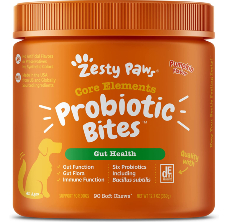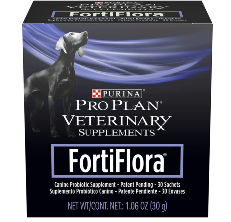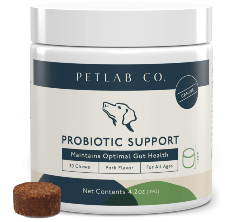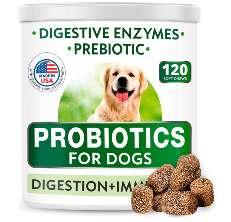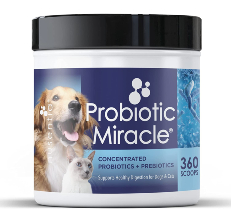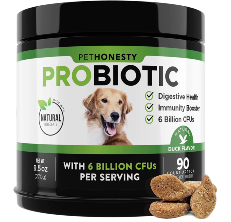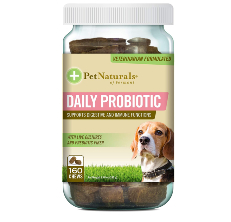- Home
- Gear Categories

Balance Wellbeing With The Best Probiotic For Dogs
These dog probiotics will keep your dog healthy, strong, and agile.
7 Dec 2020
We independently research, test, review, and recommend the best products - learn more about our process here. If you buy something through our links, we may earn a commission.

Dogs are members of the family, which is why you care for their health, provide them with plenty of exercise, well-balanced food, and arrange regular veterinarian appointments. However, when it comes to canine fitness, your dog may be lacking a critical component: beneficial bacteria. A healthy gut includes beneficial microorganisms that break down food particles and aid indigestion. However, if the gut gets imbalanced, harmful bacteria may outnumber the good germs that should be present in your dog’s stomach and intestines. The best probiotics in 2024 are specifically made to improve the health of your canine. These can aid in the restoration and maintenance of this balance of healthy and harmful microorganisms.
Highest-Rated Dog Probiotics of 2024 in Detail
Best Overall :
Zesty Paws Probiotic for Dogs
Key Features
- It is a powerful biotic which contains DE111
- It supports the tummy
- It supports gut flora
If your dog has digestive issues or has regular tummy troubles, a probiotic containing digestive enzymes may help to improve digestion and regulate evacuation. Zesty Paws Probiotic Bites are a great all-natural supplement that works well for dogs of all sizes. Each Zesty Paws probiotic bite contains 6 strains of probiotics and prebiotics, as well as over 3 billion CFU, which is comparable to some prescription-strength probiotics. This probiotic supplement for dogs includes a pumpkin to help the digestive tract operate properly and papaya to help the stomach break down fats and proteins.
Pros
- It supports immunity
- It has no artificial flavors
Cons
- Its quality is inconsistent
Runner Up :
Purina FortiFlora Probiotics
Key Features
- There are 30 packs in the box
- It has a probiotic to promote normal intestinal microflora
- It is recommended by vets
Purina Fortiflora Canine Nutritional Supplement is available in pre-measured packets and is one of the simplest and most popular methods to guarantee that your dog gets a daily dosage of probiotics. Whatever your reason for including a probiotic in your dog’s diet, there is a high possibility that one of the thousands of happy pet owners who use this product has solved the same issue. The usage of this supplement has considerably eased issues such as canine diarrhea, flatulence, and tear stains. It’s as simple as opening a packet and sprinkling it over your dog’s food during mealtime.
Pros
- It cures tear stains
- It is effective for diarrhea
Cons
- It is a little overpriced
Honorable Mention :
Petlab Co. Dog Probiotic
Key Features
- It has effective ingredients
- It has 2 billion CFU per chew
- It supports natural defense
Our digestive systems require additional care and probiotics, just as your dog’s digestive system requires more care, love, and attention. If your dog’s diet is deficient in nutrients or he is always fed the same bag of dry food, if he is sluggish or lacks energy, he may benefit from a specially formulated probiotic made particularly for dogs. The 8 kinds of helpful bacteria are probably definitely the standout components in this chew. As if that weren’t enough, Petalb has additionally loaded our probiotic with vitamins, minerals, and antioxidants, and these probiotics taste wonderful.
Pros
- It tastes great
- It promotes gut health
Cons
- It is a bit pricey
Most Convenient :
Bark and Spark Dog Probiotics
Key Features
- It offers the best value
- It does not have steroids
- It doesn’t contain any artificial flavors
If your pet suffers from regular stomach difficulties such as gas, diarrhea, sensitive or upset stomach, constipation, gas, acid, loose stool, foul breath, or other, daily probiotic treatments containing prebiotics, fiber, and enzymes will help alleviate these symptoms and promote good digestion. Digestive health is critical for keeping your dog free of food allergies, which can cause a variety of skin and hair problems, loss of appetite, poor energy, and changes in behavior.
Pros
- It boosts immunity
- It is best for allergies
Cons
- These are hard to chew for younger pups
Most Reliable :
NUSENTIA Probiotic
Key Features
- This formula contains 6 probiotic strains
- It has 360 scoops per jar
- Each scoop has approximately 1 billion CFU
If you’re looking for a low-cost pet probiotic, focus on quality rather than individual packaging. Nusentia Probiotic Miracle Powder is a low-cost dog probiotic. This powder mix is safe for both dogs and cats, providing significant savings and convenience to multi-pet homes. It’s also shelf-stable, so there’s no need to clear away space in the fridge or worry about it rotting in the pantry. Although this product does not contain as many CFU per dosage as some other products, the findings show that it is still extremely effective.
Pros
- It is pocket-friendly
- It is VET recommended
Cons
- It is not for sensitive dog
Also Consider :
PetHonesty Probiotics for Dogs
Key Features
- It has 7 probiotic strains
- It has pumpkin as a base ingredient
- It has a blend of enzymes
With a tasty blend of pumpkin, probiotics, and digestive enzymes, PetHonesty digestive probiotics are soft and help promote healthy digestion and intestinal health. Two of these 3grams Probiotic chews contain 6 billion CFUs, which is higher than the majority of competing products. This implies greater results and a probiotic supply that will last longer than other products. This probiotic dog supplement has a wonderful natural flavor and is available in the shape of a soft chew that your dog will enjoy. There will be no more sneaking liquids, pills, tablets, or powders in your dog’s food. PetHonesty supplement chews function as a reward and give an opportunity for you and your dog to bond.
Pros
- It is vet recommended
- It supports healthy digestion
Cons
- Some ingredients are not good for dogs
Key Features
- Each container contains 160 chews
- It is free of corn
- It is manufactured in the USA
Pet Naturals daily Probiotics include prebiotics help to create an environment in the stomach where probiotic cultures and colonies may thrive. Pet Naturals Probiotics aid in the treatment of gassiness, flatulence, foul breath, and elimination problems in dogs. Pet Naturals probiotic can also help with a healthy coat, digestion, and overall immune system support. It is recommended for dogs that have environmental, breed-specific digestive problems, neurotic digestive disorders or are presently on antibiotics.
Pros
- It promotes digestive health
- It supports immune system functions
Cons
- The smell is awful
Leading Dog Probiotics: A Buyer's Guide
Probiotics are among the fastest-growing supplements for your pooch that helps in building a healthy gut. The reason behind its popularity is that other supplements can have a drastic impact on your dogs’ health and immune system. If you are confused about choosing the best probiotics for dogs, this guide will help you along with the purchase.
What Are the Things to Consider Before Buying Probiotics for Dogs?
Probiotics from Several Strains
While we don’t completely understand the advantages of each type of probiotic, each strain appears to have unique benefits. As a result, we recommend going for a product that has many strains rather than just one. Bacterial strains should be stated on the ingredient panel, and they should frequently begin with terms like Lactobacillus or Bifidobacterium.
Colony Forming Units (CFU)
Probiotics must survive going through your dog’s very acidic stomach in order to be useful. Given this, the quantity of colony-forming units (CFU) in a probiotic is important, and it should be as large as feasible. We recommend selecting a product with at least 3 billion CFU. Often, low-cost probiotics contain considerably fewer bacteria and are unlikely to be effective on your dog.
The Structure (Soft Chews or Powders)
Probiotics are available in a variety of forms for dogs, the most popular being a powder or a soft chew. Soft chews, while appealing to dogs who feel they are receiving a reward, sometimes lose their effectiveness during production or after the box is opened. We enjoy powders, but we recommend the tub and spoon method again since moisture might enter and ruin the substance. Individual single-use packets are perfect for storing the product until it is needed.
Which Are Some Useful Tips to Buy Dog Probiotics?
Choose the right flavoring
Probiotics alone are not always appealing to dogs; therefore flavoring must be added. According to our study, several manufacturers include a dubious substance in their powder to enhance the flavor. Purina’s most widely marketed probiotic, for example, has “animal digest” as the first component. We recommend avoiding undefined proteins and instead opting for a product with a single ingredient taste enhancer, such as beef or chicken liver.
Probiotics vs. prebiotics
Probiotics require a food supply in order to function properly. Prebiotic fibers are a type of fiber that healthy gut bacteria consume. While natural sources of prebiotics such as beans, peas, chicory root, and Jerusalem artichoke can be fed to your dog, these foods may be difficult to provide to your dog. Therefore we recommend picking a probiotic product that includes a prebiotic component, such as inulin.
Consider an option with digestive enzymes
In order for a dog to get the nourishment in its food, its digestive system must be able to digest the nutrients effectively. Kibble-fed dogs frequently lack digestive enzymes because these microorganisms cannot withstand the high heat heating procedure required by dry diet. In order to balance your dog’s GI system in as many ways as possible, the ideal canine probiotic would also include digestive enzymes.
What Is the Best Probiotic for Dogs?
Lactic Acid Probiotics
The great majority of probiotic supplements include lactic acid bacteria, which are often derived from fermented milk. Their strain names, as well as the species name, may be found on the supplement label. Bifidobacterium and Lactobacillus species are frequently represented as B. or L. As a result, you may encounter B. Longum or L. acidophilus.
Probiotic Yeast
Saccharomyces boulardii is a beneficial yeast that is regarded as a probiotic. In humans, Saccharomyces boulardii is used to treat acute and chronic diarrhea, and a recent experiment in dogs shown the same advantages. S. boulardii has also been used successfully to treat Candida and yeast infections. S. boulardii also aids in the treatment of digestive problems caused by persistent inflammation. It has the ability to change cell signaling pathways in the immune system. S. boulardii is unusual in that it cannot be destroyed by antibiotics. It can be used along with antibiotics to protect beneficial gut flora and avoid antibiotic-related diarrhea.
Probiotics that form spores
Bacilli strains of probiotics, unlike Lactobacillus and Bifidobacterium, are spore-forming. These bacteria have the ability to create a hard coating that protects them against heat, stomach acids, and the majority of antibiotics. For this reason, many antibiotics are derived from soil-based probiotics. Bacilli are also known as soil-based probiotics because of their abundance in soil and water.
How to Pick a Dog Probiotic?
Distinct bacterial strains
Individual strains of bacteria have been marketed as anti-inflammatory, anti-cancer, and even anti-aging, but these advantages are only realized when the bacteria collaborate with hundreds of other species. It’s a good idea to pick a probiotic that contains a variety of bacteria strains so that their varied advantages can complement one other and no group gets overly predominant.
Capsule with an enteric coating
Enteric coatings are placed at the top of several medicines, including certain probiotics, to prevent stomach acid from destroying the medication within. Because enteric coatings are composed of long-chain carbohydrates that are not digested by the organism, they seldom cause GI irritation, even in individuals with severe digestive problems.
People Also Asked
Q: IS IT SAFE TO FEED MY DOG PROBIOTICS ON A REGULAR BASIS?
A: Stomach problems can have a negative impact on your pet’s loving temperament and playful nature. If your cat or dog seems lethargic, depleted of energy, or weary, it might be due to poor intestinal health. However, you may give your pet probiotics on a regular basis to help them get back on their feet as soon as possible!
Q: WHAT IS A NATURAL PROBIOTIC FOR DOGS?
A: Yogurt or kefir with living cultures is a wonderful source of natural probiotics for dogs. Cultures are sometimes used in the production of yoghurt or kefir by certain brands, but they are not probiotics. Artificial sweeteners, which can be harmful to dogs, may be found in yoghurt and kefir.
Q: HOW DO I GIVE A PROBIOTIC TO MY DOG?
A: To give your dog probiotics, mix the required quantity of powder in his or her normal food, or offer them chews, which are essentially extremely healthy treats.
Q: IS IT SAFE FOR DOGS TO TAKE PROBIOTICS WHILE ON ANTIBIOTICS?
A: When using probiotics during an antibiotic treatment, it is critical to avoid taking these two drugs at the same time to decrease the chance of the good bacteria in the probiotic being destroyed before it can have any positive impact. It is advised to wait at least two hours between taking these two medicines.
Contributors
Former Special Forces Canine Handler
